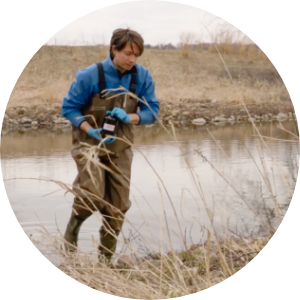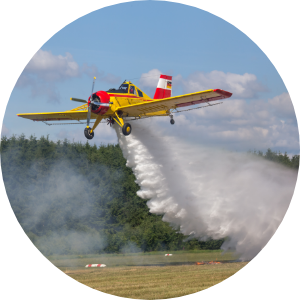Our Water > PFAS
Protecting Drinking Water from PFAS
PFAS are toxic, long-lasting chemicals that pose serious health risks—and they’ve been found in water across our state. Clean Wisconsin is working to limit exposure, hold polluters accountable, and protect communities from harm.
Jump to Section
Explore Our Approach
Overview
What Are PFAS and Why Should You Care?
PFAS (per- and polyfluoroalkyl substances) are a group of more than 6,000 synthetic chemicals used since the 1940s. Known for resisting water, oil, and heat, they’re found in products like non-stick cookware, food packaging, water-resistant clothing, upholstery and firefighting foam.
But their durability comes at a cost: PFAS don’t break down, contaminating water and building up in our bodies. In Wisconsin, they’ve been detected in drinking water, lakes, rivers, soil, and even air—posing a growing threat to public health.
The Wisconsin DNR created an interactive map showing where PFAS have been found across the state. Check it out.
$100M
Annual healthcare costs in Wisconsin linked to PFAS
4.4%
Average property value drop in PFAS-affected areas
$105B
Value of Wisconsin agriculture at risk from PFAS
1
Single PFAS exposure can lead to buildup in your body
6,000+
PFAS chemicals in use today
Videos
Stories That Matter
https://youtu.be/-CJIzoUGaAU
Price of Pollution: Toxic PFAS contamination devastates two Wisconsin communities
COMMON CULPRITS
Where are PFAS Found?
PFAS are everywhere:
- Firefighting foam (especially on military bases and at airports)
- Textiles and packaging (like fast-food wrappers and rain jackets)
- Household products (like non-stick pans and stain-resistant carpets)
- Cosmetics, medical products, and more
Once used, PFAS can leach into water and soil, contaminating drinking supplies and ecosystems.
Health IMPACT
What’s at Risk?
PFAS are often called “forever chemicals” because they don’t break down and can accumulate in the human body over time.
Health impacts from high levels of PFAS exposure include:
- Suppressed immune response (e.g., reduced vaccine effectiveness)
- Increased cholesterol levels
- Higher risk of high blood pressure during pregnancy
- Lower birth weights
- Increased risk of cancers (kidney, prostate, testicular)
- Decreased fertility
- Hormone disruption
Most exposure happens through contaminated drinking water, food, and household dust—making prevention and cleanup efforts essential.
KEY INITIATIVES
What Are We Advocating For?
Clean Wisconsin is leading the fight against PFAS contamination across the state. We’re working to protect public health, support communities affected by toxic exposure, and hold polluters accountable. Our efforts focus on strong science-based regulations, funding for cleanup, and transparency in PFAS use and contamination.

Setting Strong State Standards
We advocate for science-backed drinking water, surface water, and groundwater standards for PFAS to ensure Wisconsin communities are protected—no matter where they live.

Supporting Statewide Testing and Public Notification
Clean Wisconsin has pushed for comprehensive PFAS testing in public water systems and private wells, and for clear, accessible public notification when contamination is found.

Holding Polluters Accountable
We support legal and legislative efforts to make sure those responsible for PFAS contamination—not taxpayers—cover the cost of cleanup and damages.

Securing Funding for Cleanup and Protection
Clean Wisconsin advocates for the use of federal and state funds to help impacted communities test their water, install filtration systems, and remove contamination.

Banning Harmful PFAS Uses
We’re working to phase out the use of firefighting foam and other consumer products that are major sources of PFAS pollution, especially when safer alternatives exist.
Resources
PFAS Pollution Resources
Explore Clean Wisconsin’s latest reports, toolkits, and updates on PFAS contamination and advocacy.
Press Releases
Trump Administration moves to weaken standards for toxic ‘forever chemicals’ in drinking water
A little more than a year after announcing its first ever drinking water standards for toxic PFAS chemicals, the Environmental Protection Agency (EPA) is reversing course, announcing it intends to rescind regulations for four key types of toxic PFAS compounds.
See NewsLatest News
Expert Insights
Clean Wisconsin helps organize Wisconsin’s first PFAS Summit
In a first-of-its-kind event, a state-wide PFAS group hosted its inaugural PFAS Summit at Rib Mountain State Park in Wausau earlier this summer.
Read MoreExpert Insights
Podcasts
What to know about PFAS pesticides
A look what could soon be sprayed on food and farm fields across Wisconsin.
Listen NowLatest Podcast
Action Alert
SIGN UP
Join the Fight Against PFAS Pollution
Sign Up For Email Updates
"*" indicates required fields